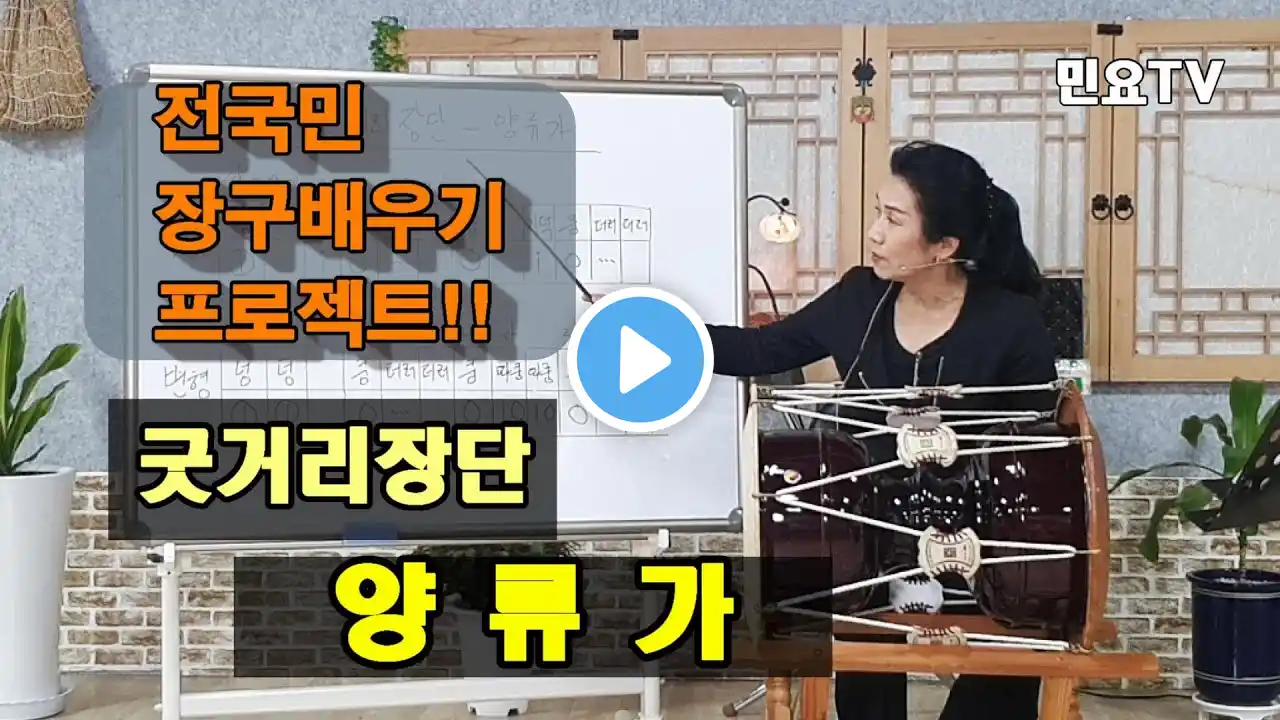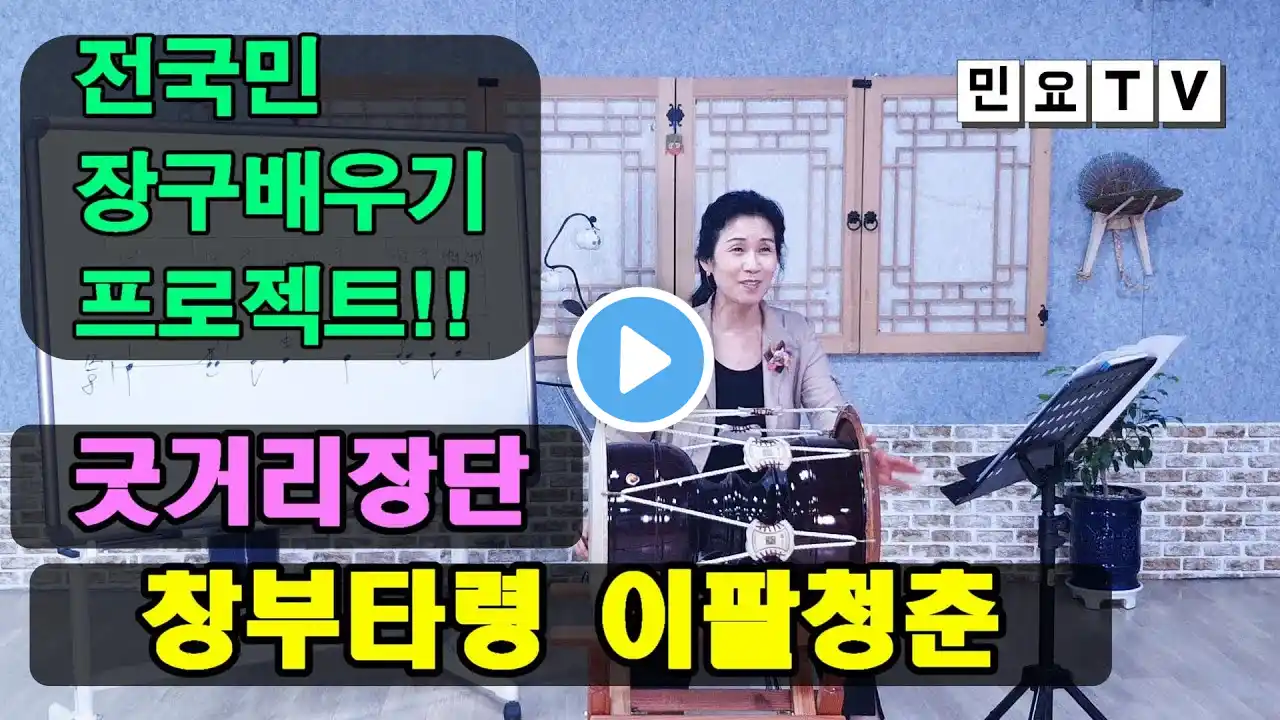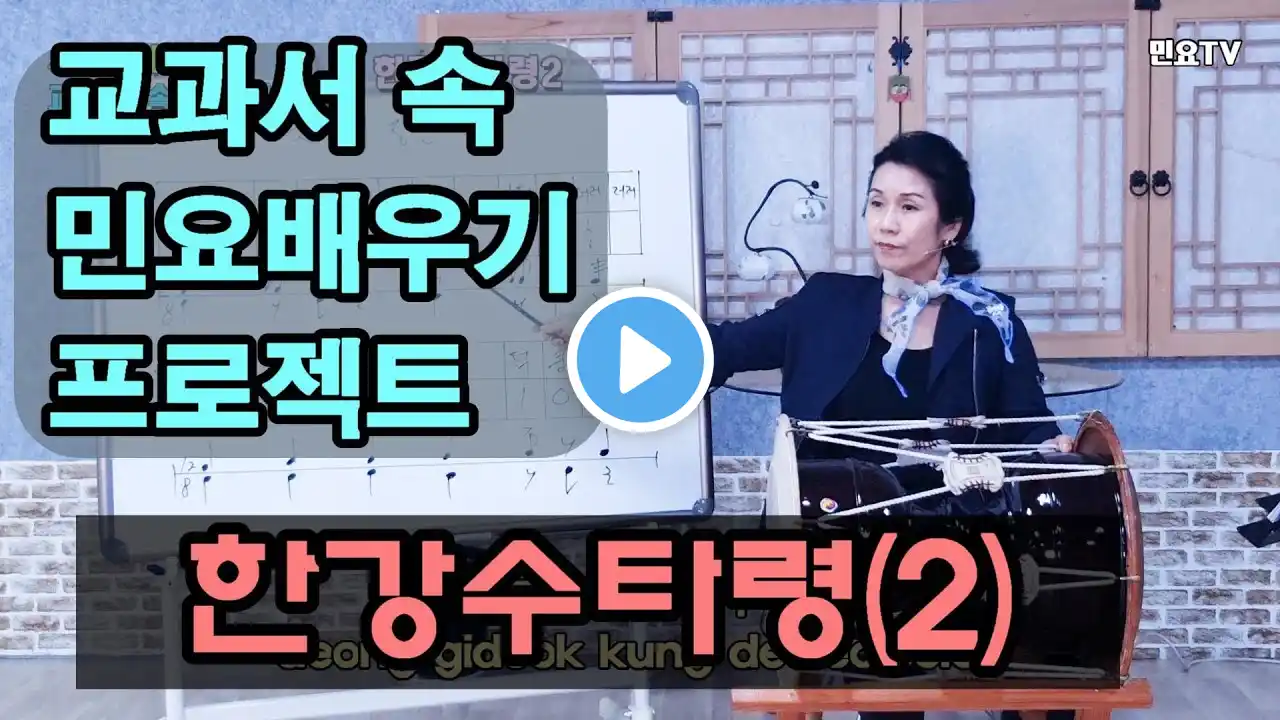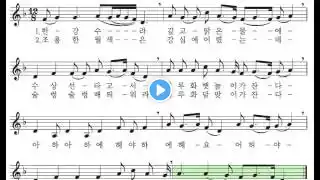
굿거리장단 배우기(변형) – 한강수타령 '한강수라, 고요한' ㅣ 서행복의 알기쉬운 민요반주법, Korean folk song accompaniment, 韓國民謠 講習
#서행복 #굿거리장단 #서행복의알기쉬운민요반주법 #한강수타령 #민요TV 전국민 장구배우기 프로젝트 '서행복의 알기쉬운 민요반주법ㅣ 굿거리장단 배우기(변형) – 한강수타령 '한강수라, 고요한' : Easy Korean folk song accompaniment of Seo Haeng-bok / Gutgeorijangdan 7, 韓國民謠 講習 ‘장구(Janggu)’로 민요 반주하는 방법을 ‘서행복(Seo Haeng-bok)’ 강사와 함께 배워보는 코너로 ‘굿거리장단(Gutgeorijangdan)’ 일곱번째 시간입니다 ‘굿거리장단(Gutgeorijangdan)’은 ‘세마치장단(Semachijangdan)’과 함께 경기민요(Gyeonggi Minyo)의 대표적인 장단(Jangdan)으로 약간 느리지만 흥겨운 리듬으로 되어 있습니다 경기민요(Gyeonggi Minyo) 중에서는 ‘창부타령(Changbutaryeong)', ’청춘가(’Cheongchunga), ‘태평가(Taepyeongga)’, ‘한강수타령(Hangangsutaryeong)’ 등이 ‘굿거리장단(Gutgeorijangdan)’으로 되어 있으며 구음으로는 '덩(deong) 기덕(gideok) 쿵(kung) 더러러러(deoleoleoleo) 쿵(kung) 기덕(gideok) 쿵(kung) 더러러러(deoleoleoleo)' 로 되어 있고 박자는 12/8박자입니다 장단을 모르고 노래하는 것과 장구를 치면서 노래하는 것은 큰 차이가 있습니다 어렵지만 처음부터 장구를 치면서 노래하는 습관을 들여보세요 초보자도 계속 따라 하다 보면 누구나 민요 반주를 할 수 있으니 함께 배워보세요^^ 아울러 한국어를 잘 모르는 국내외 외국인들을 위하여 민요의 가사를 영어로 표기하고 곡목 해설을 영어로 표기할 예정이니 노래도 배우고 한국어도 함께 배워보세요 이 영상이 도움이 되셨다면 '좋아요(Like)'와 '구독(Subscrition)' 버튼을 눌러 주세요 '구독' 은 영상 아래 오른 쪽에 붉은 색으로 된 '구독'버튼을 누르면 됩니다 '구독' 버튼은 한번만 누르면 되고 '구독중'으로 검은색으로 바뀌며 신문 구독과 달리 돈이 빠져나가지 않으니 안심하고 누르셔도 됩니다 '좋아요'는 영상 아래 오른 쪽의 엄지척 모양을 누르시면 됩니다 이 영상을 영상 아래 오른 쪽의 '공유' 버튼을 눌러서 각자의 카톡이나 페이스북, 카페 등으로 공유할 수 있습니다 '좋아요'와 '구독' 및 '공유'는 동영상을 제작하는데 큰 도움이 됩니다 민요 장구 강습문의 : 한국국악교육원(韓國國樂敎育院, Korean Traditional Music Center) T 02-394-3480, 010-5232-3834, 서울 강북구 도봉로 150, 창림빌딩 5층 민요TV 후원하기 : 농협 013-01-300057, 한국국악교육원 (후원금은 민요TV의 더 좋은 콘텐츠제작을 위해 사용됩니다) 교재 구입하기 : 15,000원(발송비 포함), 농협 013-01-300057, 한국국악교육원 (입금 후 02-394-3480로 전화요망, 입금 시는 꼭 본인 이름으로 입금해 주세요) 강사 서행복 약력 - 전숙희명창 경기민요 사사 - 원광디지털대학교 전통공연예술학과 졸업 - 진주교육대학교 교육대학원 석사과정 - 맹사성전국국악경연대회 대상 - 대한민국연예대상 국악공로상 - 대한민국국악대상 대상 - 현재 / 한국국악교육원 부원장 강북국악예술단 단장 민요TV 구독하기 페이스북(서행복) 블로그(서행복의 민요이야기) 유튜브(한국국악교육원TV) It's a segment where you learn how to perform folk songs with Janggu with a teacher named "Seo Haeng-bok " It's the seventh time of "Gugeorijangdan " Gutgeorijangdan, along with Semachijangdan, is the representative rhythm of Gyeongi Minyo, a little slow but exciting Among Gyeonggi Minyo, "Changbutaryeong," "Cheongchunga," "Taepyeongga" and "Hanggang Water Taryeong" are known as "Gutgeanjiang" and "Gangsutyeong" There is a big difference between singing without knowing the rhythm and playing the janggu It's hard, but make a habit of playing chess and singing from the beginning If you keep following the beginner, everyone can perform folk songs Learn with them ^^ Also, for foreigners at home and abroad who do not know Korean well, we will write the lyrics of folk songs in English and Vietnamese, so learn the songs and learn Korean as well If this video is helpful, please press the "Like" and "Subscription" buttons, and if you have anything you want to say, please leave a comment I'll reflect your suggestions in the video production as much as possible Thank you Korean Traditional Music Center T 02-394-3480, Dobong-ro 150 in Gangbuk-gu, Seoul, 5F Changlim Building Trainer(s) Seo, Haeng-bok Profile - Studied under Jeon Sook Hee-Myeongchang - Graduated from the Department of Traditional Performing Arts at Wonkwang Digital University - Master's course at the Graduate School of Education at Jinju National University of Education - Subject to the Maeng Sa-sung National Gugak Competition - Gugak Achievement Award for the Korean Performing Arts - Target of the Korean Traditional Music Awards - Current / Deputy Director of the Korean Traditional Music Education Center Director of the Gangbuk Gugak Art Troupe Facebook (success) Blogs (Many of Happiness) YouTube (Korea Institute of Gugak Education TV)


















